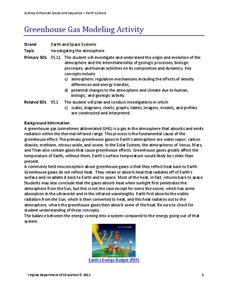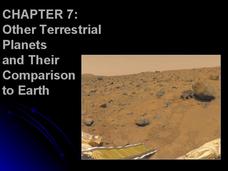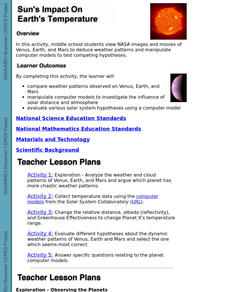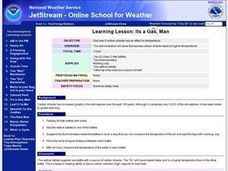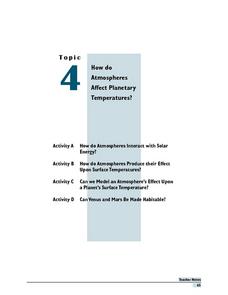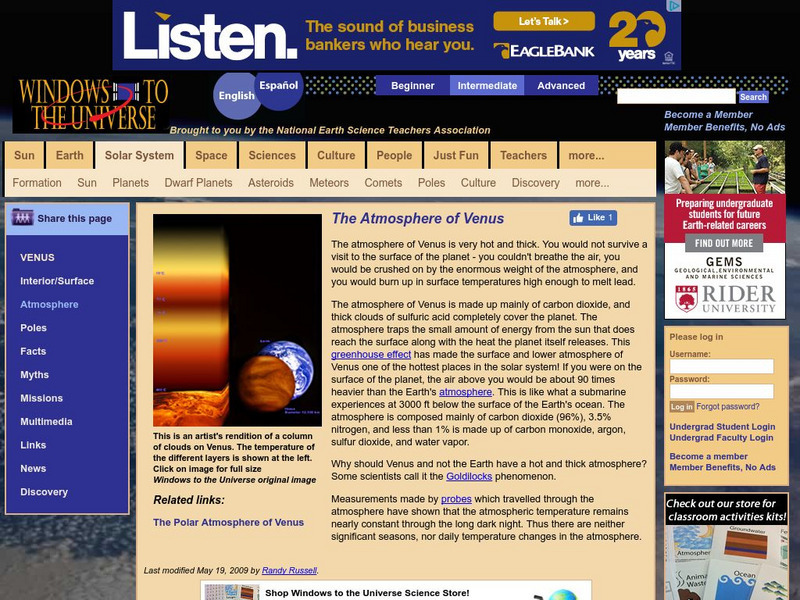Curated OER
Runaway Greenhouse Effect Exercise
Students role-play biologists, coal geologists, space warfare experts, astronomers, pollution-control scientists, and hydrophysicists as they answer the question, "Why is Venus so much hotter than the Earth?"
Virginia Department of Education
Greenhouse Gas Modeling Activity
Why are greenhouse gases called greenhouse gases? Young Earth scientists learn about greenhouse gases though experimentation in the second installment of a 3-part series. They use lamps to model radiant energy as well as warming through...
Curated OER
The Greenhouse Effect
Pupils complete a group experiment which simulates the greenhouse effect as well as compare the climate on Earth to the climate on Venus following a class discussion on the greenhouse effect.
Curated OER
Solar Effects on Global Warming
Students explore the greenhouse effect and how it affects our climate. In this global warming instructional activity students draw the sun and label features and describe the effects of the sun's energy on the world.
Science 4 Inquiry
Temperature of Inner Planets
Mars, Earth, and Venus contain atmospheres that generate weather. Young scientists explore the temperature of inner planets. They create a model simulating the greenhouse effect before researching and answering guided questions to...
Rice University
Characteristics of Inner Planets
Aspiring astronomers assess the inner planets using this handout. They read about the characteristics of each, noting that all four of them have rocky surfaces. Rotation and revolution are introduced, including Venus' retrograde...
Glynn County School System
Terrestrial Planets
Mercury, Venus, Earth, and Mars are collectively known as the terrestrial planets. Although part of the same group, each planet has its own set of characteristics. Scholars explore the characteristics that make the planets unique and...
Curated OER
The Goldilocks Principle: A Model of Atmospheric Gases
Students discuss the characteristics of the Goldilocks Principle. They discover the pressure and chemical composition of Venus and Mars. They discuss how the Earth's temperature is affected by the atmosphere.
Curated OER
Sun's Impact On Earth's Temperature
Students view NASA images and movies of Venus, Earth, and Mars to deduce weather patterns and manipulate computer models to test competing hypotheses. They manipulate computer models to investigate the influence of solar distance and...
Curated OER
Learning Lesson: Its a Gas, Man
Young scholars participate in a demonstration in which they examine the effect on temperature by carbon dioxide. They discuss the effects of carbon dioxide on the environment. They also examine summer safety rules to end the lesson.
Curated OER
Atmospheric Chemistry
If you need a comprehensive review of the development of Earth's atmosphere through the ages, then this is for you! The presentation starts with a introduction to theories of planet formation and initial distribution of isotopes in the...
Curated OER
How Do Atmospheres Affet Planetary Temperatures?
Students perform a literature search and use reputable research resources in order to find the surface temperature of different planets in our solar system. They speculate about the observed and unobserved factors. Then brainstorming is...
National Earth Science Teachers Association
Windows on the Universe: Air on Venus
Windows to the Universe offers a description of Venus' atmosphere, including what it is made of and why it is so hot and thick.
Georgia Department of Education
Ga Virtual Learning: Our Solar System
This interactive tutorial will take students on a tour of our solar system. Students begin near the Sun with the really hot planets of Mercury and Venus. They will learn about Mars, probably the first planet that humans will visit. Next...
TeachEngineering
Teach Engineering: Spacecraft Design: Beat the Heat
To understand the challenges of satellite construction, student teams design and create model spacecraft to protect vital components from the harsh conditions found on Mercury and Venus. They use slices of butter in plastic eggs to...
University Corporation for Atmospheric Research
Ucar: Comparing Planetary Gases
Use jelly beans to compare the compositions (amounts of different gases) of the atmospheres of Earth, Mars, and Venus.



